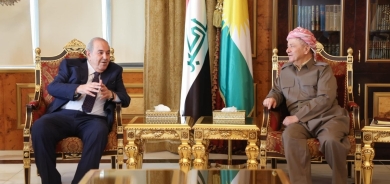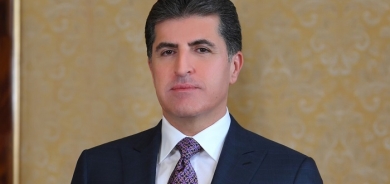Yossi Mekelberg: [the international community and the Security Council] have not only the inability to resolve [Syrian problem] but also the inability even to contain it
March 2, 2015
Exclusive Interviews
![Yossi Mekelberg: [the international community and the Security Council] have not only the inability to resolve [Syrian problem] but also the inability even to contain it](https://gulanmedia.com/public/old_images/t_dimana/5300.jpg )
Mekelberg: I do believe it has already collapsed but differently the world order refused challenges very much. There is a sense that there is a return of some sort of Cold War because of what happened in Ukraine and the role that Russia and President Vladimir Putin are playing. So, definitely in the post-cold war, it is quite obvious that no one has challenged the hegemony of the United States. There are definitely great challenges for the United States. The fact that Russia is very much involved in Crimean is the element of deterrent and collapse. In the Middle East, with the Arab Spring and the rise of radical movements like Daesh, there are definitely great challenges. Even in the case of Arab-Islamic conflict, the Obama administration failed quite miserably. In addition, what is happening in Nigeria with Boko Haram and what happens within European Union with the rise of right wing movements and the emigration, there is also a great challenge in almost all aspects to the world order. Whether the United States and the United Nations’ friends, the European Union, rise up to these challenges, time will tell.
Gulan: The challenges the world is facing in 2015 are geopolitical changes, not only in Middle East, but also in Europe especially after the invasion of Crimea by Russia and rejecting Ukrainian membership of EU. Don’t you agree that this is also a return to another cold war?
Mekelberg: After the collapse of Soviet Union in 1989 and 1991, the United States has been an obvious hegemonic power. Russia needed desperately the support of the United States to come out of Communism, but this is not the case now. You see that there is a strong element of challenging America. One has to understand that Russia has legitimate concern about the expansion of NATO and the extension of the European Union to its borders, but it is gone beyond these and close to the attempts by Russia to restore some serious influence within the region. I think the economic situation and the fall of oil prices and the loss of the value of Robel affected Russia to push too fast.
Gulan: do you think in the current circumstances of the world, a coalition can be made or everyone is seeking its own interest?
Mekelberg: I think the pursuit of the national interest is not changing automatically. However, I think the rise of Islamic extremists pose threat in Paris and Denmark, and of course they pose threat in Iraq, Syria, and Libya. This is really a threatening situation in so many countries. By the way, Russia is playing with this only at the level of national interest may be counteractive. There is a need to unite actually to face this challenge within Europe and outside of Europe, otherwise it might spread. When I say facing this threat, it is not only militarily. Military means is only one way to deal with this but also addressing for instance the risks in Iraq, the civil war in Syria, governance in Libya, there are so many difficult issues that need to be addressed in the right way. No one addressed them properly as a result they weakened the governments, societies are disintegrated and in this, radical movements emerged and entered the countries.
Gulan: since the emergence of Syrian revolution against Assad’s regime in 2011, the international Security Council has not been able to shape a kind of concrete strategy to deal with the regime and this has resulted in the creation of the current chaos. And the Security Council has been unable to make a decision regarding Syrian situation. As a result eight to nine million Syrian citizens have been displaced both internally and to the neighboring countries, hundreds of thousands have been killed and injured, so don’t you think that the current situation of Syria implies that the Security Council has no solutions and is currently paralyzed to take any decision to Syria?
Mekelberg: I actually fully agree with you. I think that what happens in Syria is a very good indicator of the weakness not only of the United Nations but also a symbol of the low world order and the security arrangement within the international community. No one gets a good enough answer, rises to the challenge that the civil war or the revolution actually posed to the international community. I think this is actually created the crack we have seen within the society in which the Al-Qaeda, Jabhat Al-Nusra, and now ISIL, and different groups found the space to operate and actually have so much impact well beyond the real power because the Security Council and the international community could not provide answers. They won’t become agreed among themselves. The United States, Brittan, France, China, and Russia disagree. They provide short-term answers. It is one of the weaknesses of the international community. It moves from crisis to crisis. They provide maximum short-term answers while the situation needs long term dealing with these developments: with gender equality, good governance, transparency, and containing radicalism. The things happen in Syria expose the weakness of the United Nations and Security Council and show that there are more mechanisms to deal with it. They have not only the inability to resolve it but also the inability even to contain it.
Gulan: the experts say that the main problem in the Middle East goes back to the formation of the Sykes-Picot Agreement following the collapse of the Ottoman Empire since the in drawing the borders, the ethnic and religious diversity have not been taken into consideration and almost everyone knows that this is a core of the problem. So why are not attempts available for redrawing the regional borders based on the modern manner as Mr. President Barzani mentioned that the new map was going to be drawn by blood?
Mekelberg: this is the very unfortunate reality that things are not done through dialogue and negotiations. People can’t look at the new reality and address them in a peaceful manner, and because they don’t do that the more radicals, those who believe in shedding blood and using force, take advantage of that. There is no again mechanism to negotiate changes, to deal with new realities not only in the Middle East but especially in the Middle East, and the result of it, one way or another, there is an outburst of violence, but what really needed is to create a mechanism in which groups can actually negotiate the new realities in the Middle East especially the one that has been created after the beginning of the Arab Spring.
Gulan: regarding the Islamic caliphate of ISIS, we have seen the regional countries are dealing with it based on their interests. Some of the regional countries are in favor of Assad’s regime remaining in power, and others are secretly working for toppling Assad’s regime by aiding terrorist groups. So how can the anti-terrorism international coalition defeat ISIS with these problems?
Mekelberg: I think we should divide the answers. Military threat or stop the violence by ISIS is the one right now with a very limited success but I think the biggest picture is even if ISIS is defeated, how the region insures that there is no attraction whatsoever to anyone to be part of such a movement, how is the Middle East changing in a way that we have more inclusive societies, societies that have a good governance and everyone in state holder within the society which marginalize radical society.
Gulan: The only force on the ground that is capable of holding the ISIS back is the Peshmerga forces, to what extent has the world to support the Peshmerga to defeat ISIS terrorists?
Mekelberg: I think we have seen much more support than before to Peshmerga. I just saw a call from the Iraqi prime minister talking about driving ISIS out of Mosel in the very near future. I think there is a combination there of forces so far working together, and from what I see and I heard people in the area supporting this end. Right now I think the people are supporting the Peshmerga and the forces that fight ISIS. I think that all in the west are wishing well for the Kurdish people and nice to see better days in which there is no threat to the life and culture.















